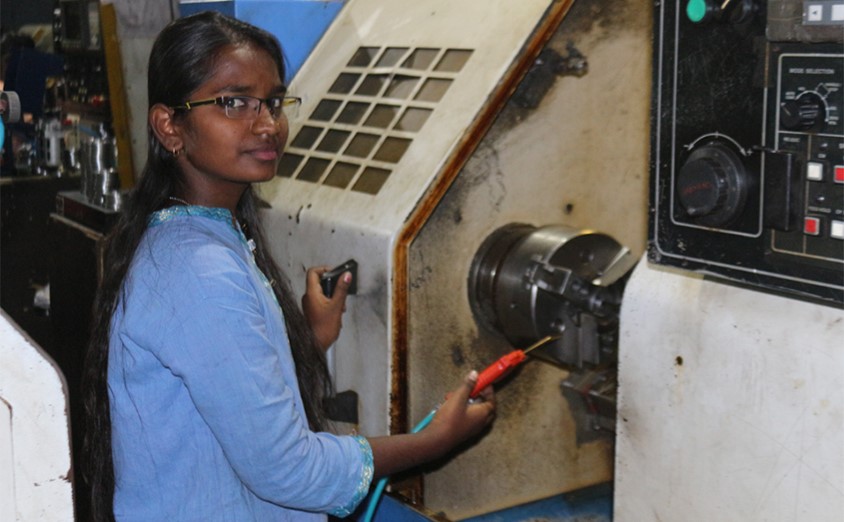Please update your browser.

Stories
Giving Students in India the Tools to Build a Motorbike...and a Future
Lend A Hand India is one of 700 global partners in JPMorgan Chase's jobs and skills initiative, which recently made a $25 million commitment with the World Bank to develop job and skills training in India.
Vaishnavi Londhe, a high school senior in Pune, India, loved her classes, but she also loved the idea of getting out into the real world. And so, when she had to choose between taking a language course or “multiskilling," a vocational class with a real-world engineering component, she jumped at the opportunity to get her hands dirty.
“Multiskilling was the only course that offered practical sessions, instead of only theoretical things out of the book," she recalls. “I was really excited about the opportunity to do practical sessions outside of the school in an actual factory."
Internship placements were part of the curriculum, and soon Londhe had her new assignment: working on a CNC fabrication machine at Suyog Industries, in a factory that produces motorbike components. She programmed the CNC, or computer numerical control machine, to fabricate bike gears, which she then measured to ensure that the machine was making them to specs.
Londhe, the only female on the shop floor, was eager to work at her CNC machine—to the dismay of some of her coworkers. The full-time workers each had to produce a certain amount of components per week, but Londhe, as an intern, wasn't given a quota. Without a clear-cut goal, she still exceeded the output of her peers. She told her coworkers, “I'm here to work as much as possible."
Londhe is one of the 800,000 students who have received vocational internships with local small and micro entrepreneurs through Lend A Hand India, an organization that works to develop job opportunities for ambitious youth in India. Lend A Hand India is one of 700 global partners in JPMorgan Chase's jobs and skills initiative, which recently made a $25 million commitment with the World Bank to develop job and skills training in India.
In cooperation with 8,500 schools and 24 state governments, Lend A Hand India focuses on preparing students in grades 9-12 for sustainable employment by teaching them in-demand skills. It also works closely with parents, schools and teachers to identify promising students, and encourage them to opt for vocational subject education, says Anjali Verma, a manager at Lend A Hand India.
That last part was especially helpful for Londhe. She says that girls like her, who come from low-income families, rarely get a chance to study. But when her parents heard about the program, they were happy to let her join. “They said 'It's your life, and you should make it,'" she recalls. “Then they said, 'Once you've done that, help your younger brother and sister make their lives.'"
And Londhe wasn't the only girl in her class who leaped at the opportunity to learn about engineering and fabrication: of 15 students, nine were girls. This gender separation isn't deliberate, says Verma. “We do not differentiate between boys and girls – in fact, we encourage mixed teams of boys and girls to carry out projects," she says. “However, it is highly encouraging for us to observe a consistently higher percentage of girls enrolling for the Multi-Skill Foundation Course program than boys."
Regardless of gender, there's no question that the program is having an impact. According to Verma, 86 percent of employers offer full time jobs to the students who intern with them. In Londhe's case, she's staying on part time while she continues her education. “I'm pursuing an undergraduate degree in commerce," she says. “That way, I'll be able to do my own accounting when I own my own CNC machine —and my own business."
